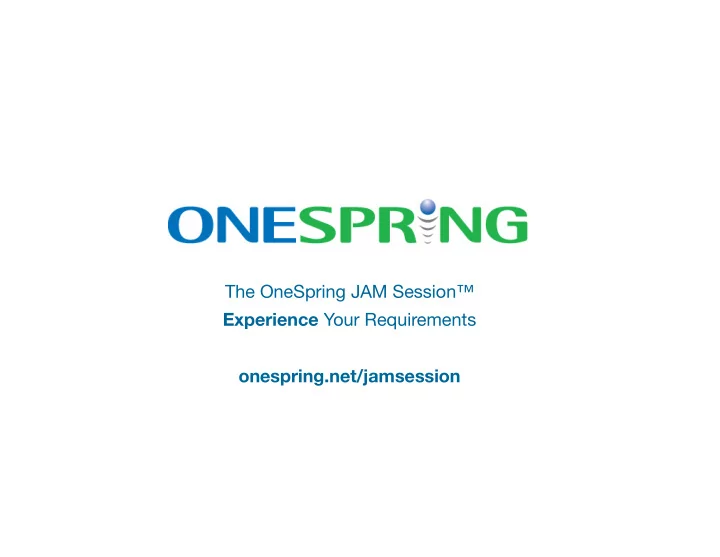

The OneSpring JAM Session™ Experience Your Requirements onespring.net/jamsession
“68% of projects fail, run late, or are OVER budget.” � - The Standish Group, 2009 Chaos Summary Report “70% of REWORK is attributed to correcting requirements errors.” � - Meta Group “30% of project costs are REWORK .” � - Forrester Research
The Stream Process™ is a framework for how to better innovate and collaborate using visualization.
Most SDLC methods provide a representation of the requirements late in the lifecycle that lack the experiential aspect altogether Traditional
The Stream Process™ occurs at the beginning of the lifecycle and provides stakeholders the ability to experience and validate their requirements from the start OneSpring
Accelerating the time to understanding provides a far greater return on investment OneSpring 100% 50% Traditional 0%
Designer
Designer Analyst
Designer Analyst Producer
We created the OneSpring JAM Session™ to improve the requirements elicitation and validation process A JAM Session allows stakeholders to experience their requirements
The Joint Application Modeling™ Session is comprised of these essential “ingredients”… + + + Rapid Small Group Visualization Flow Iterative Collaboration Design
Collaboration in small groups provides an effective means of problem solving within a structured environment Complex problems that go beyond the routine Small Group Collaboration require the communication of shared knowledge to create viable solutions/approaches
Small collaborative groups are well defined in their roles for the JAM Session… Pr Producer oducer – facilitates the experience Analyst Analyst – elicits & documents the requirements Designer Designer – crafts the experience Business Business – provides the “what?” Technology echnology – articulates the “how?”
The roles “match” the work environment and support the task flow… Visualization Scr isualization Screen een Documentation Scr Documentation Screen een Pr Producer oducer Analyst Analyst “Left Brain” Designer Designer “Right Brain” Facilitates Flow Business Business IT IT SME on “What?” SME on “How?”
“It has long been recognized that user interfaces should be designed iteratively in almost all cases...the median improvement in overall usability was 165% from the first to the last iteration, and the median improvement per iteration was 38%...” - Jakob Nielsen (Nov. 1993) Iterative User Interface Design . IEEE Computer Vol. 26, No. 11 pp.32-41. Rapid Iterative Design The requirements cannot be fully understood understood until they can be experienced experienced…
Insight – Insight – observation to gain valuable knowledge and context on the business, customer and technologies Clarity - Clarity - design activities that crystallize the gathered insights to form a model of the experience Focus – Focus – socialization and measurement of the experience model to provide continuous improvement and validation
The iterative cycle allows us The iterative cycle allows us to rapidly visualize the “big picture”, gain stakeholder consensus and then then drill-down to specific features…
From initial sketches to detailed information design, visualization incorporates the use of dynamic imagery as a means of effectively communicating requirements Visualization not only enhances a “shared understanding”, but is critical in helping Visualization stakeholders organize their thoughts and work through problems to collectively build a solution
Both the analytic and synthetic hemispheres of the brain are engaged during the visualization process Analyst Analyst “Left Brain” Designer Designer “Right Brain” Modeling Documentation
”Flow also happens when a person’s skills are fully involved in overcoming a challenge that is just about manageable, so it acts as a magnet for learning new skills and increasing challenges. If challenges are too low, one gets back to flow by increasing them. If challenges are too great, one can return to the flow state by learning new skills.” Flow - Mihaly Csikszentmihalvi (July. 1997) Psychology Today
A key aspect to generating the Flow includes both the environment in which the JAM Session takes place and the mental investment by the stakeholders Goals ar Goals are clear e clear Feedback is immediate Feedback is immediate Flow Balance between opportunity & capacity Balance between opportunity & capacity Concentration deepens Concentration deepens The pr The present is what matters esent is what matters Contr Control is no pr ol is no problem oblem Sense of time is alter Sense of time is altered ed Loss of ego Loss of ego
Stream and the JAM Session have worked successfully with numerous clients…
To learn how OneSpring can help bring clarity to your project, contact us at: clarity@onespring.net
Recommend
More recommend